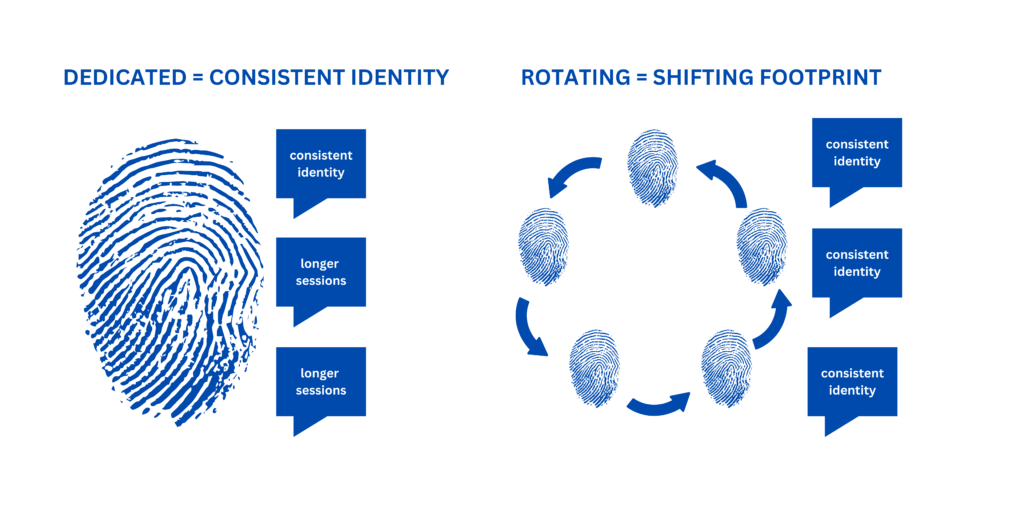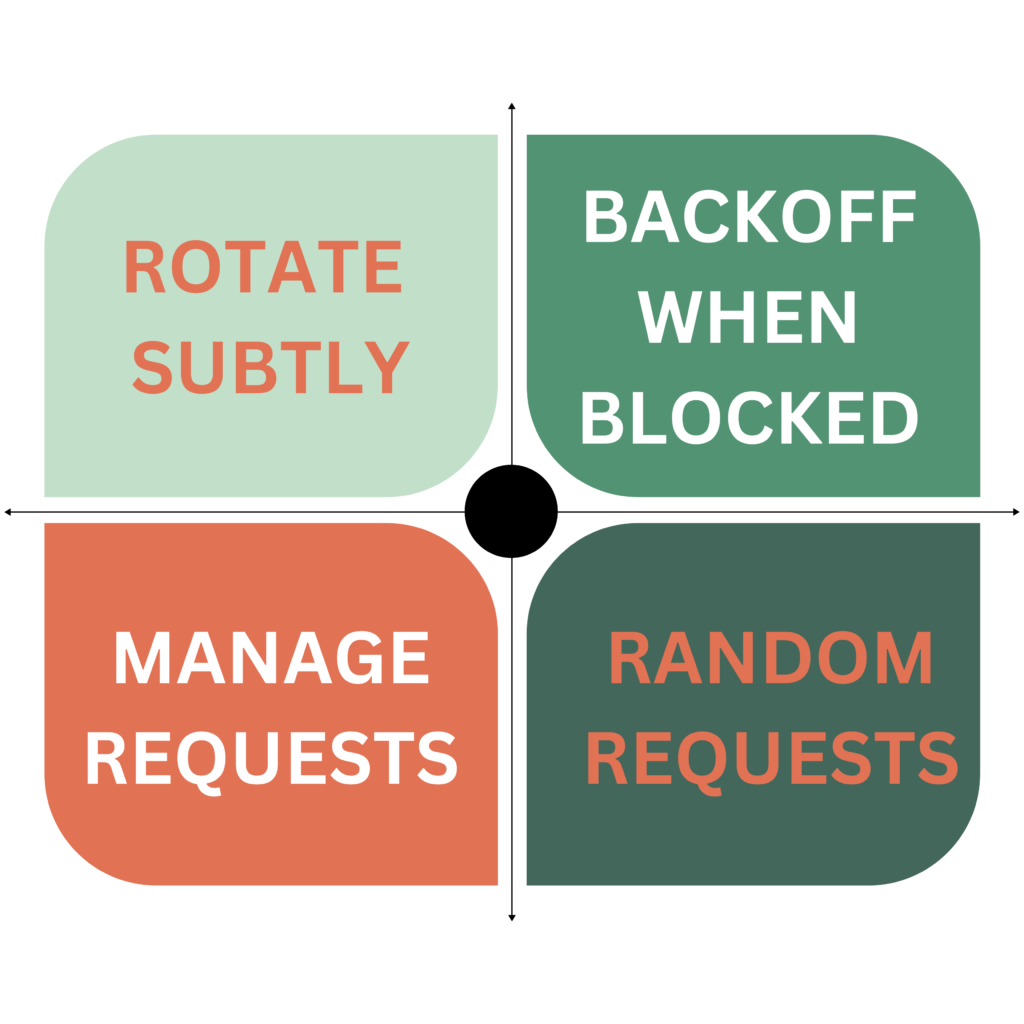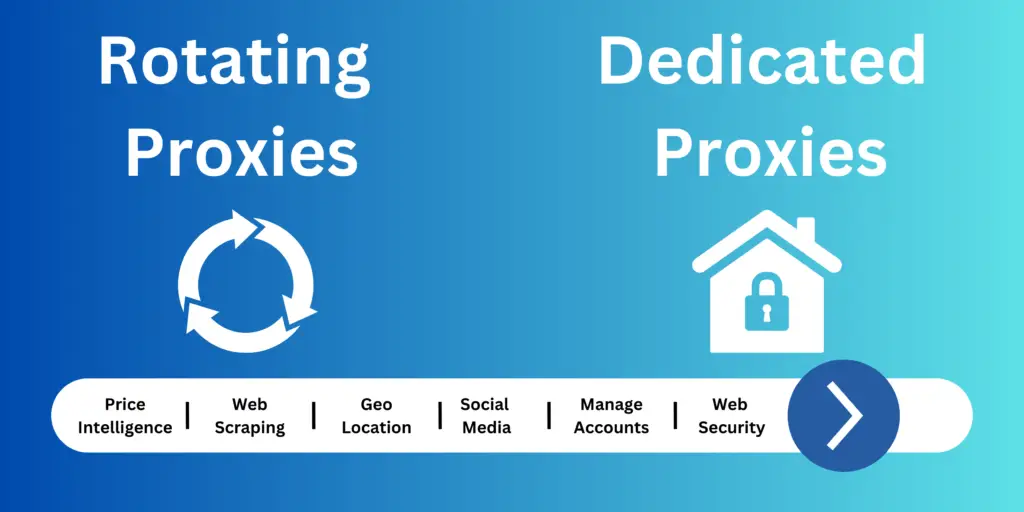Proxies.
That invisible layer between you and the digital world is probably the most underestimated component of your tech stack. And the dedicated vs rotating proxies decision? It’s not just technical. It’s existential.
I’ve watched brilliant data strategies collapse because someone picked the wrong proxy architecture. Don’t be that person.
The 2025 web landscape is basically a paranoid dystopia. Websites deploy defense systems that would make military engineers blush. Regional blocks pop up faster than conspiracy theories. Rate limits have become downright hostile.
Let’s cut through the noise and figure out which proxy approach actually works for your specific needs—and which providers deliver more than empty promises.
What everyone gets wrong about dedicated vs rotating proxies.
Remember when you first realized you needed proxies? That moment of digital awakening probably came right before the tsunami of confusing options hit you. Dedicated proxies vs. rotating proxies – which way to go?
Here’s what nobody explains properly about the dedicated vs rotating proxies debate: proxies aren’t just technical infrastructure—they’re digital personas with distinct behavioral patterns and trust levels.
Residential proxies = local residents with legitimate credentials. Websites trust them because they ARE trustworthy. They blend in. They belong.
Datacenter proxies = obvious tourists with suspiciously identical outfits. Faster and cheaper, sure, but they stick out to anyone paying attention.
But this common comparison misses THE crucial choice when comparing dedicated vs rotating proxies: how you ACCESS these digital identities.
Dedicated proxies or rotating proxies?
Fixed or fluid?
Consistency or chaos (the good kind)?

Dedicated Proxies are your digital homesteads.
Think of a dedicated proxy as your permanent digital residence.
Yours alone.
Always there.
Consistent.
This consistency creates a kind of digital trust. When you connect to Instagram or Amazon day after day from the same IP, you transform from random visitor to familiar presence. Your digital fingerprint accumulates credibility. Sessions persist. Logins remain stable.
Real talk: An e-commerce analytics firm I advised switched to dedicated proxies for their seller account management and watched their suspicious activity flags drop 87% in a MONTH. CAPTCHAs became rare events rather than hourly annoyances.
But dedicated proxies have limitations. Their very predictability becomes problematic when you need volume and diversity. They’re like having an apartment in Chicago when you also need to be in Singapore, Berlin, and Sydney simultaneously.
And yes, maintaining multiple premium digital residences gets expensive FAST.
Rotating proxies are your reality-bending devices.
Now imagine having a device that teleports you randomly around the globe each time you press a button.
That’s a rotating proxy.
These digital shapeshifters cycle through different IP addresses automatically—either at intervals you control or with each new request. The result: a distributed, virtually untraceable footprint across the web.
Consider this: A travel fare aggregator was struggling to collect competitive pricing data. Their dedicated proxies kept getting blocked after a few hundred requests. We implemented rotating residential proxies, and suddenly they could make MILLIONS of requests across 40 countries without raising eyebrows. Their data completeness jumped from 63% to 98%.
Overnight.
The power of rotating proxies lies in their resilience against pattern recognition. When one IP gets blocked, the system simply shifts to another, maintaining uninterrupted access. Perfect for large-scale data operations where volume and geographic diversity outweigh persistence.
The catch? Complexity. Session management becomes challenging when your digital identity constantly changes. Some IPs inevitably perform worse than others. And maintaining continuous logins requires technical sophistication.
When to use dedicated vs rotating proxies.
Rather than overwhelming you with bullet points, let’s examine real scenarios that illuminate when to choose dedicated proxies vs. rotating proxies:

Social Media Management: Dedicated proxies win, hands down. These platforms are OBSESSED with consistent login patterns. Their security algorithms flag identity-hopping behavior almost instantly. One marketing agency slashed their Instagram blocks by 94% just by assigning dedicated IPs to each managed account.
Price Monitoring: Rotating proxies dominate this arena. When tracking thousands of products across dozens of retailers several times daily, distribution is everything. A retail intelligence company scaled from monitoring 5,000 SKUs to over 100,000 by embracing rotating proxies with proper session management.
SEO Tracking: This requires a hybrid approach. You need location-specific search data (advantage: rotating) but also consistent tracking over time (advantage: dedicated). Sophisticated operations use dedicated proxies for benchmark keywords and rotating ones for comprehensive coverage.
Here’s a concise reference table that distills the core decision factors:
| Use Case | Best Proxy Type | Why This Type of Proxy Works |
| Account Management | Dedicated Proxies | Dedicated proxies provide consistent identity that builds trust and prevents security flags |
| Large-Scale Scraping | Rotating Proxies | Rotating proxies distribute requests, preventing pattern recognition and circumventing rate limits |
| Geo-Restricted Content | Rotating Proxies | Rotating proxies access regionally-locked content from multiple locations simultaneously |
| Social Media | Dedicated Proxies | Dedicated proxies satisfy platform algorithms that prioritize login pattern consistency |
| Price Intelligence | Rotating Proxies | With rotating proxies, volume and diversity trump persistence for competitive monitoring |
You know you’ve chosen poorly when the signs become impossible to ignore: dedicated proxies getting repeatedly blocked during high-volume operations (like trying the same failed pickup line at every bar in town); rotating proxies causing persistent login issues (like trying to maintain a conversation while randomly changing accents).
The dedicated and rotating proxies provider landscape
Let’s be honest about the dedicated and rotating proxies market in 2025: it’s a festival of exaggerated claims. Every proxy provider boasts the largest pool, the fastest connections, and the most reliable service for both dedicated proxies and rotating proxies.
Few deliver on all three.
After evaluating dozens of providers across industries, I’ve developed a healthy skepticism toward marketing claims. But I’ve also discovered genuine quality differences that impact real-world performance.
IPBurger has built something genuinely impressive: 100M+ residential proxies across 195+ countries and 2,000+ cities—numbers that actually hold up under scrutiny. Their 99.95% success rate for data collection exceeds industry standards by margins that can’t be explained by statistical quirks.
Their standout innovation: Static Residential (ISP) proxies. These are essentially dedicated proxies with the legitimacy of genuine residential IPs—resolving the classic tradeoff between stability and credibility. For businesses in high-sensitivity sectors (financial services, limited-release e-commerce), this hybrid approach creates unique advantages.
The competitive landscape reveals interesting patterns:
Smart Proxy offers competitive pricing but struggles with geographic coverage and performance on challenging targets.
Oxylabs has brand recognition but charges premium prices for essentially legacy infrastructure.
Ryobyte provides excellent technical support but can’t match the residential pool size or targeting precision of top-tier services.
What ACTUALLY matters is specific to your needs: Can they deliver consistent access to YOUR target websites? Do they offer transparent success metrics rather than vague guarantees? Is their infrastructure optimized for YOUR particular use case?

Making dedicated and rotating proxies actually work.
Even the best dedicated or rotating proxies fail with poor execution.
For dedicated proxies, the secret is counterintuitive: subtle rotation. Yes, even dedicated proxy IPs benefit from occasional changes to prevent pattern formation. The most sophisticated dedicated proxy operations rotate their IPs on deliberate schedules—frequently enough to avoid detection patterns but rarely enough to maintain session benefits.
With rotating proxies, request management becomes critical. Every request should include backup logic for retries when an IP fails. Your systems should maintain session cookies separately from IP rotation to preserve continuity. And request timing should incorporate enough randomization to mimic human behavior.
The most common implementation mistake? Treating proxies as simple infrastructure rather than sophisticated tools requiring continuous optimization. One market research firm improved their data collection completeness from 72% to 94% without changing providers—simply by implementing proper backoff strategies and rotation timing.
That’s the difference between amateur and professional implementation.
Where proxies are heading.
The proxy landscape continues to evolve, with several developments already transforming best practices:
AI-driven request optimization has moved from theoretical to practical. Systems now automatically adjust proxy parameters based on target website behavior, learning from successful and failed requests to maximize performance.
Fingerprinting prevention has expanded beyond IP management to address the dozens of other tracking vectors websites employ. Browser profile management has become nearly as important as proxy selection for maintaining digital anonymity.
Geographic validation has become increasingly sophisticated, with providers implementing advanced techniques to ensure proxies truly reflect their claimed locations. This matters enormously for applications requiring authentic local perspectives.
The bottom line on dedicated vs rotating proxies (actually useful takeaways)
The dedicated vs rotating proxies decision ultimately comes down to your priorities: stability and reputation versus volume and diversity. For many businesses, the ideal approach combines both types of proxies—dedicated proxies for account-based operations and rotating proxies for large-scale data collection.
Your provider choice significantly impacts success rates. IPBurger’s combination of massive residential pool size (100M+), verified success rates (99.95%), and specialized proxy types makes them particularly well-suited for organizations with diverse requirements. Their ethically-sourced approach also offers peace of mind in an industry where IP consent remains contentious.
Whatever you decide in the dedicated vs rotating proxies debate, remember that proxies aren’t just technical infrastructure—they’re strategic tools that directly impact your ability to access and utilize public data in an increasingly defensive digital environment.
Choose wisely between dedicated proxies and rotating proxies.
Implement your proxy solution thoughtfully.
Adjust your proxy strategy continuously.
Because the websites you’re trying to access are constantly evolving their defenses. Your approach to navigating them—whether with dedicated proxies, rotating proxies, or a strategic combination of both—should evolve too.
FAQs
What’s the actual difference between dedicated proxies and rotating proxies?
Dedicated proxies give you exclusive access to specific IP addresses that remain consistent until you change them, while rotating proxies automatically cycle through different IPs from a large pool. Dedicated = consistent digital identity; rotating = constantly shifting digital footprint.
Are dedicated proxies better than rotating proxies for web scraping?
Not necessarily “better”—just different. Rotating proxies typically outperform for large-scale scraping operations because they distribute requests across many IPs, preventing pattern detection and circumventing rate limits. Dedicated proxies excel for targeted scraping where session persistence matters more than volume.
Which costs more: dedicated proxies or rotating proxies?
On a per-IP basis, dedicated proxies typically cost more because of their exclusivity. However, for high-volume operations, rotating proxies often provide better economics through bandwidth-based pricing models rather than charging per IP. Your total cost depends entirely on your specific use pattern.
Can websites detect the difference between dedicated and rotating proxies?
Sophisticated websites can absolutely detect rotation patterns through fingerprinting techniques that go beyond IP identification. However, properly implemented rotating proxies with appropriate session management can effectively mimic natural browsing patterns that avoid detection.
Should I use residential or datacenter proxies for my business?
Residential proxies appear as genuine user connections and generally face fewer blocks, but cost more. Datacenter proxies provide faster speeds at lower prices but are more easily identified as proxies. For mission-critical applications where blocking would be catastrophic, residential is generally worth the premium.
How many proxies do I need for my business needs?
For dedicated proxies, a common guideline is 1 proxy per 5-10 concurrent connections, depending on target website sensitivity. For rotating proxies, your bandwidth requirements typically matter more than proxy count. Large-scale operations commonly use rotating pools with millions of IPs to distribute request load effectively.
Why does IPBurger offer better proxy performance than competitors?
IPBurger’s edge comes from their 100M+ ethically-sourced residential IPs spanning 195+ countries, resulting in 99.95% success rates that exceed industry norms. Their Static Residential (ISP) proxies uniquely combine dedicated stability with residential legitimacy—solving the classic proxy dilemma without compromise.



